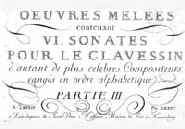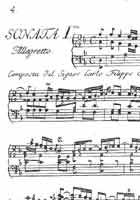Nuremberg publisher Johann Ulrich Haffner's Oeuvres melées appeared in 12 volumes (each containing six solo keyboard sonatas) between 1755 and 1766. The repertoire was aimed at a growing market of amateur players and contains a wide variety of interesting material, varied in scope and technical demands and sometimes specifically intended for teaching purposes at different levels.
From the musicologist's point of view, it also presents a comprehensive cross-section of keyboard music in varying styles by a wide range of contemporary composers and straddles the evolution of successive baroque, galant and 'classical' modes of expression.
Given that our knowledge of the keyboard sonata in the second half of the 18th century is in need of considerable updating (the key text for this area is now roughly half a century old), Haffner's dozen volumes offer a good starting point for revisiting the stylistic and generic issues that will have to underpin a large-scale project to rewrite the developmental and reception history of the sonata in the classic era.
A particular feature of Haffner's anthology is its extraordinary breadth of geographical coverage. The composers represented were active not just at mainstream centres such as Berlin (represented by such composers as C.P.E. Bach, Benda, Fasch, Kirnberger, Marpurg), Vienna (Wagenseil, Monn) Venice (Galuppi) and Salzburg (Leopold Mozart, Adlgasser, Eberlin), but also 'peripheral' centres such as Copenhagen, Stockholm, St. Petersburg, Prague, Brussels, Lübeck and Cremona, to name but a few.
Our existing understanding of the classical sonata is underpinned by the concept of a 'centre' and a 'periphery'; reconsidering the status and usefulness of such a relationship will be just one of the issues challenged by this research.

